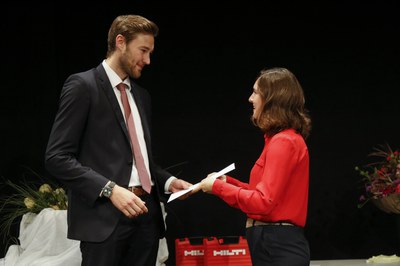Konrad Wurst received an award from Hilti for his Bachelor's thesis at this year's graduation ceremony. For the business administration graduate from the University of Liechtenstein, this was just one of the highlights in his career so far. His recipe for success is good planning and time management. And a university that offers a personal and appreciative environment.
The 23-year-old Vorarlberg native completed his degree in business administration at the University of Liechtenstein so successfully that he was able to benefit from a simplified admission procedure for his current Master's programme at the HSG. With HC Alpla Hard he became Austrian handball champion and cup winner several times. And because the day has 24 hours, Konrad works as a junior data specialist at TOWA, a leading digital agency in Vorarlberg. Reason enough to find out more about his recipe for success and his tips for prospective students.
At this year's graduation ceremony at the University of Liechtenstein in September, you received a prize from Hilti for your Bachelor's thesis entitled «Verbesserung von Entscheidungsprozessen im Kontext industrieller Supply Chains durch den Einsatz von Digital Twins» (Improving decision-making processes in the context of industrial supply chains through the use of digital twins). What does that mean?
My bachelor thesis is about physical products being mirrored in digital space. All information about the product is also made available there. This uniform and comprehensive information can then be used to make better decisions in the context of supply chains - even across company boundaries.
Hilti award for the best bachelor thesis

Is there a practical example of this perfect supply chain?
An automobile manufacturer mirrors the complete car in the digital space. That means all components are digitised. This makes it possible to track at any time whether a component such as a screw is available at a certain time at a certain place, which supplier has this screw in stock, by when he can deliver it or whether there is an alternative supplier for it. The use of these digital twins will be a decisive factor in supply chain management in the future.
Have you already received a job offer from Hilti?
(laughs) No, not yet. But I would be happy to!
A successful business degree, an excellent bachelor's thesis, multiple Austrian national handball champions with HC Alpla Hard and working for a large digital agency on the side: how do you reconcile such a workload?
With the large amount of training and the many handball games, my time management also became more and more important - already in high school. In addition to my bachelor's degree in business administration, I also wanted to know how things work in the business world. So I started working as a student trainee to combine theory and practice. To be able to fit in sport and work alongside my studies, I have to make the most of idle time at university. I therefore fill the day with studying and working, take advantage of all the home office offers and have the evenings free for training.
You recently completed your Bachelor's degree in Business Administration with a specialisation in Information Management and Information Technology at the University of Liechtenstein. Looking back, what were the highlights of the campus in Vaduz?
My entire time in Liechtenstein was a highlight! Because this university is so small, I had excellent contact with all the lecturers. Here, you can quickly and easily clarify personal concerns and questions, and you always get deep insights into topics of the degree programme that are interesting.
I chose my specialisation in Information Management and Information Technology because digital transformation is becoming increasingly important and is shaping our future. I'm not a hardcore programmer or a proven strategy expert, but I see myself at the interface between business and IT. This is exactly what the Bachelor of Business Administration is perfect for.
You work in an agency while you study. Did your business studies give you practical know-how?
It wasn't so important for me to apply what I learned directly. But the critical thinking and questioning that I learned at the University of Liechtenstein helped me a lot in practice. I learned how to approach new problems, understand a business model and know what questions to ask and what problems to solve.
Of course, not everything is the same in everyday work as it is taught in theory. But it is definitely very helpful if you understand the basic theory from your studies and can build on it.
Many students from Vorarlberg first think of Innsbruck or Vienna when it comes to choosing a place to study. How did you come to the University of Liechtenstein?
At first I wanted to study economics in Vienna - the classic way. But then I quickly realised that at WU (Austria’s biggest University for Economics in Vienna) I was just a number among 20,000 students. This "mass processing" was too impersonal and not appreciative enough for me. At the same time, I wanted to continue my handball career in Hard. So I looked around in the region for a course of study and came to the University of Liechtenstein via an information event. It was immediately a completely different feeling than at WU Vienna: much smaller and more personal.
It became clear to me very quickly that the focus here really is on people and personal development. This first impression was also confirmed during my business studies in Vaduz. I can only recommend to everyone to take part in a "student for a day" at the University of Liechtenstein and see the whole thing live on site.
You are now doing your Master's in Business Innovation at the HSG. What is the difference between these two universities?
The university in St. Gallen is a lot bigger and the name HSG is in the foreground. It was simply important for me to study at a larger university. In the seminars themselves, however, a lot of emphasis is placed on working in small groups and there is no question of mass processing here.
Looking back: how do you find the right university and the right degree programme?
I would recommend not seeing the location as the most important criterion. For example, many decide on Vienna first and only then look at what they want to study there. It's more important to at least begin to define your goals and then see where you can complete the right degree programme.
The business location in the Rhine Valley in particular offers the best career prospects, and when it comes to choosing the right university, the University of Liechtenstein is certainly a top address - both for the Bachelor's degree and for a specialisation in the Master's degree.
What are your plans for the future?
What definitely interests me is the interfaces between business and IT and IT consulting. But I can't yet say exactly where the journey will take me. With a good Master's degree, there are certainly many opportunities open to me. And when the right opportunity comes along, it's a case of grab it and go for it!
After the basic training in the Bachelor's programme, I'm now concentrating on my education. That's why I'm also cutting back on sport and have increased my workload to 50% alongside my Master's degree.
How much can you work on the side without affecting your studies?
It's perfectly feasible to work 20-30% alongside your Bachelor's degree. It is important to have a flexible employer who understands that you cannot always be available.
Your studies - your future
Apply now until July 31 to study at the University of Liechtenstein!
Click here to go to the application
Author: Gernot Bilz, Communication and Marketing, University of Liechtenstein
Photo HC Alpla Hard: Walter Zaponig



